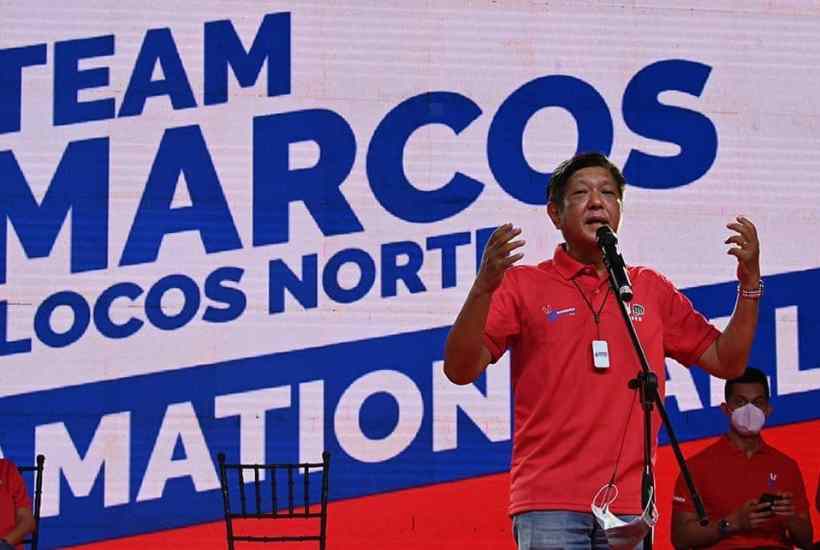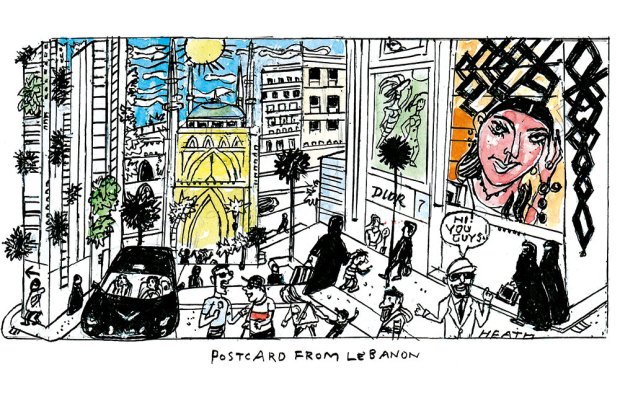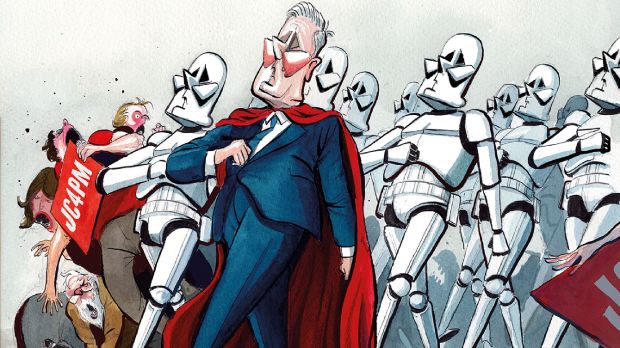For Ferdinand ‘Bongbong’ Marcos Jr, the frontrunner for Monday’s Philippine presidential election, a reframing of the country’s past has been crucial to securing his future. Last week, he reminded a television audience what a ‘political genius’ his late father, the dictator Ferdinand Marcos Sr, was. Bongbong’s revisionist history has infuriated many Filipinos but, it seems, resonated with many more. Polls show that he has a 30-point lead over his closest rival, the current vice-president Leni Robredo, though she has drawn massive crowds and expects a late surge of support.
Thirty-six years ago, after the ‘people power’ revolution ended, Marcos Sr’s dictatorship and sent the family fleeing to Hawaii, it seemed inconceivable that the Marcoses would ever return to the Philippines – more so as details emerged of the eye-watering fortune the ex-president and his wife Imelda had amassed. But two years after his death in 1989, the family was allowed back, ostensibly to face corruption charges. And so began the remarkable political resurgence of Ferdinand and Imelda’s only son.
When Marcos Sr was elected in 1965, the country had a dynamic economy. But corruption became endemic and martial law was imposed. Under Marcos’s 21-year rule, it is believed that more than 3,000 political enemies, activists and journalists were killed and thousands more tortured or jailed.
The Presidential Commission on Good Government, set up in 1986 by the subsequent administration, also estimates that the Marcoses accumulated $5-10 billion in personal wealth while the country ran up massive debts in an infrastructure splurge and the funding of Imelda’s many vanity projects – including the Coconut Palace she built for the 1981 visit of Pope John Paul II (he refused to stay in it) and a resort hotel constructed for her daughter Irene’s wedding. Most of the family’s fortune is still unaccounted for and no Marcos has been jailed. In 2018, Imelda was sentenced to 42 years on corruption charges; aged 92, she remains free on appeal.
Although Imelda has tried twice to win back the presidency for the family – with dismal results – Bongbong, as he is known by his friends and enemies alike, has long had his eye on the prize. As a child he played himself in a propaganda feature film, The Ferdinand E. Marcos Story, in which he spoke of his political dreams. ‘I will serve my country, especially the poor,’ he proclaimed. ‘And for their children I’ll give them toys so they will not cry anymore.’
Bongbong’s comeback to the political life he had been involved in before the family’s exile began with winning a congressional seat in 1992. He later returned to provincial governorship and then served as a senator. In 2016, running to be vice-president, he lost to Robredo (in the Philippines the president and vice-president are elected on separate tickets), but made the unlikely claim that his novice rival had cheated. The supreme court finally dismissed his electoral protest in February last year. This time, not only is he the clear favourite to win the presidency but his running mate, Sara Duterte, daughter of the current president Rodrigo Duterte, is also far ahead in the polls.
The notion that, after what transpired first time around, the people of the Philippines could vote for another Marcos may seem unfathomable – but there are plenty of younger Filipinos who know little about the family’s past and many older ones who believe that authoritarian leadership is what’s needed to move the country forward.
Bongbong is articulate and can engage affably across multiple demographics. He looks younger than his 64 years and wears his hair a little long without going the full Michael Fabricant. He has run on a message of ‘national unity’, though critics suggest that requires establishing goodwill by returning stolen wealth, acknowledging human-rights violations by his father and paying the taxes his family owes – all pretty unlikely concessions. He has swerved presidential debates and mainstream media interviews. Instead, he has stuck to the political staple of handouts at rallies for the masses and slick online campaigning to the younger electorate.
A friend in a largely opposition province says his wife is horrified by the prospect of another Marcos in power – but that her much younger siblings barely believe what she tells them about the earlier regime. Fifty-six per cent of the 65 million eligible voters are aged 18 to 41, and Bongbong has used TikTok, Facebook and YouTube to spread his disputed take on Marcos history and how he will pick up his father’s mantle and move the country on.
Any incoming president will inevitably get template congratulations and a commitment to improving bilateral relations from Boris Johnson, but politically and economically it matters little to Britain who wins. The Philippines is the UK’s 64th largest trading partner, accounting for 0.1 per cent of total trade. For many of us, it’s only seen as the country with the polite call-centre folk who try to sort out our banking inconveniences or the nurses who help to keep the NHS functioning.
Nonetheless, Bongbong’s links with Britain might jolly the future relationship along. He’s a huge Beatles fan and went to Worth school in Sussex. He claims to have a BA in PPE from St Edmund Hall, Oxford, even if the university’s recollection is that he didn’t complete his degree but was awarded a special diploma in social studies.
Although the final tallies can take weeks, it seems likely Bongbong will have a majority large enough to make the customary claims of vote-rigging an irrelevance. Like his father, he will start with an economy in good shape. Before Covid, the country was seeing annual growth of around 6 per cent. Nearly a quarter of the population still live in poverty but, with the past strategically reframed, Marcos’s talk is of tackling inequalities and delivering economic reform. If there is to be a second President Ferdinand Marcos of the Philippines, it will offer history a second opportunity to pass judgment.
Got something to add? Join the discussion and comment below.
Get 10 issues for just $10
Subscribe to The Spectator Australia today for the next 10 magazine issues, plus full online access, for just $10.
You might disagree with half of it, but you’ll enjoy reading all of it. Try your first month for free, then just $2 a week for the remainder of your first year.














Comments
Don't miss out
Join the conversation with other Spectator Australia readers. Subscribe to leave a comment.
SUBSCRIBEAlready a subscriber? Log in